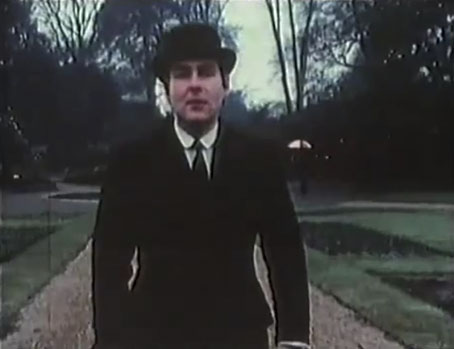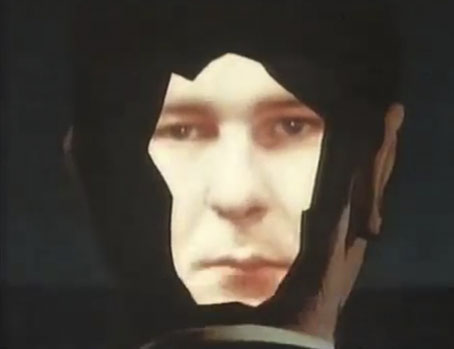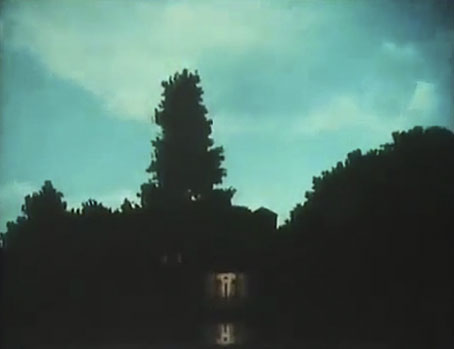René Magritte as portrayed by Patrick McDonnell.
René Magritte died in 1967, the year Eric Duvivier’s La femme 100 têtes appeared in French cinemas. Magritte is even less visible cinematically than Max Ernst, IMDB lists a couple of documentaries and nothing else. There are trace elements elsewhere, notably the Magritte and de Chirico influence in Bertolucci’s Borges’ adaptation The Spider’s Stratagem (1970), but the artist’s arresting visual imagination has always found more of a welcome on book covers than cinema screens.
One exception is David Wheatley’s drama documentary René Magritte (1976), yet another work you won’t find listed at IMDB. This was Wheatley’s graduation film which the BBC screened in a 30-minute version (shorn of some apparently clunky dialogue scenes) in 1979, and which secured for Wheatley a place as a regular director for the BBC’s Omnibus and Arena arts programmes. I saw the 1979 broadcast, and caught it again a decade later when one of the channels was having a season of Magritte-related programming, something that’s impossible to imagine in today’s debased television landscape.
For a student film it’s a stunning piece of work, taking a similar approach to Eric Duvivier in bringing to life many of the artist’s more famous pictures: a window shatters to reveal the scene behind it painted on its panes, a mountain hovers ponderously over the sea, a dove made of clouds flies across a stormy sky. Between the artworks there are short biographical scenes. There’s a sole version of the film on YouTube that remains watchable despite being a low-quality recording from video tape that’s also hacked into three parts and subtitled in Danish.
Looking for more information about David Wheatley it was dismaying to find he’d died in 2009, aged 59. Leslie Megahey—a cult TV director of mine—wrote an obituary for the Guardian where he describes some of Wheatley’s other productions including the Arena film Borges and I (1983)—as far as I’m aware the only British TV documentary about Jorge Luis Borges—and Wheatley’s first feature film, an adaptation of Angela Carter’s The Magic Toyshop (1987). I recall enjoying the latter, produced at a time when the success of The Company of Wolves (1984) made it seem there might also be a place in the cinema for Angela Carter’s imagination; we know how that worked out. The Magic Toyshop doesn’t seem to have had a DVD release so good luck to anyone searching for it. As for René Magritte, if anyone runs across a better online copy be sure to leave a comment.
Previously on { feuilleton }
• The Public Voice by Lejf Marcussen




For Magritte in cinema, Alain Robbe-Grillet’s “La Belle Captive” is more or less built around Magritte visual references (it’s not that good of a film, unfortunately). There are some good representative stills here: http://www.myreviewer.com/Le_Belle_Captive_The_Beautiful_Captive_DVD_Review/a120182
Oh, nice, thanks. I’ve got a lot of time for Resnais’ Last Year in Marienbad but Robbe-Grillet put me off years ago when I read about his Nouveau Roman theorising then tried reading some of his fiction. Consequently I’ve never sought out his films, which never seemed to turn up on TV here in any case (back in the days when subtitled films still got a regular screening on UK TV).
Taxandria is another so-so film based on Surrealist art, Paul Delvaux being the artist this time. By an odd coincidence Alain Robbe-Grillet has a credit for the screenplay.
http://www.youtube.com/watch?v=iFnNbPePS1k
I’m sure I have this on videotape somewhere. I think it was retransmitted about the time of the Magritte retrospective at the Hayward Gallery in 1992. There is also “Magritte ou La Lecon de Chose” by Luc de Heusch 1959, only 16 minutes long but made in the artist’s lifetime.
Of course Magritte’s own home movies, interesting and humorous can be seen on website of the Brussels Magritte Museum.
Hi Palmyrin. I have the film on tape as well but can’t access it at the moment so it was good to find another copy. I didn’t know about the other films, however, thanks for the tip.
My friend, the documentary maker, Jack Bond met Magritte in New York in the mid-sixties. “He looked like a fucking bank manager” was the extent of Bond’s reminiscence of their encounter.
As for Robbe Grillet – L’éden et après (1970) and Glissements Progressifs Du Plaisi (1974) are worth seeking out.
Headache inducing, but very pretty.